Since the passage of the Florida Firearms Owners’ Privacy Act in 2011, it’s been illegal for doctors and other medical professionals to ask their patients whether they own guns, or to discuss with them the potential dangers of firearm ownership. In response, a group of doctors, several healthcare advocacy groups, and the American Civil Liberties Union have sued the government of Florida, claiming that the Firearms Owners’ Privacy Act is an unlawful restriction of doctors’ First Amendment right of free speech.
In December 2015, the federal court of appeals sided with the government, arguing that the Firearms Owners’ Privacy Act’s restriction of free speech is a reasonable means of protecting medical patients’ Second Amendment right to bear arms. Popularly known as Docs vs. Glocks, the case of Wollschlaeger v. Governor of the State of Florida illustrates the tensions that can exist between the different constitutional rights enjoyed by the American people.
What Is the Florida Firearms Owners’ Privacy Act?
The Firearms Owners’ Privacy Act was a response to reports of gun owners being “harassed” about gun safety during medical visits. Under the rationale of upholding medical patients’ right to keep and bear arms, Florida legislators wrote a law that prohibits licensed health care practitioners and facilities from:
- Intentionally entering information pertaining to a patient’s firearm ownership into his or her medical record when the information is not relevant to the patient’s health or safety, or the safety of others
- Asking whether the patient or the patient’s family owns firearms unless the medical professional believe in good faith that the issue is relevant to the patient’s or a third person’s health or safety
When medical professionals violate the act, they may face penalties ranging from fines, a temporary suspension, or the revocation of their medical license. While twelve other states have considered similar legislation, only Florida has actually passed such a measure into law.
Understanding the Legal Challenge to the Firearms Owners’ Privacy Act
The medical professionals who are challenging the Firearms Owners’ Privacy Act argue that the law restricts free speech in the worst possible way—by creating a content-based regulation. The government can only enact a content-based restriction of free speech when it has a ”compelling” interest in doing so. The opponents to the Firearms Owners’ Privacy Act claim that protecting patients from hearing about gun safety from medical professionals is not a compelling interest.
There’s a further argument that the law’s restriction on a doctor’s ability to discuss guns with patients may actually put the people of Florida at risk. The law’s opponents argue that, owing to the connection between guns, accidents, and suicides, doctors are being forced to ignore an important health-related topic with their patients. Indeed, if a patient were a motorcycle rider, a doctor would be justified in discussing the importance of proper protection and training—why can’t a doctor do the same with a gun-owing patient?
Finally, opponents of the Firearms Owners’ Privacy Act argue that a doctor’s questions about firearm ownership do not in any way interfere with the patient’s right to keep and bear arms. Even assuming that a doctor’s speech regarding guns constitutes irrelevant harassment, no amount of speech from a medical professional can effectively keep a patient from exercising his or her right to purchase, keep, or use a firearm.
Why the Federal Appeals Court Upheld the Firearms Owners’ Privacy Act
The appeals court has advanced the following argument in defense of the Florida Firearms Owners’ Privacy Act:
- The free speech of professionals such as doctors may be regulated to a greater extent than the speech of regular citizens
- The government has a compelling interesting in protecting the rights of Floridians to keep and bear arms
- When doctors discuss gun ownership with patients, the patients may potentially be dissuaded them from buying or owning a gun, which constitutes a violation of their right to keep and bear arms
The court of appeals also pointed to the gun owners’ interest in privacy. The court stated that “the right to privacy in one’s status as a firearm owner is sacrosanct and thus compelling” and that information about firearm ownership contained in a patient’s medical file “could one day fall into the wrong hands or be used for purposes of harassment.”
There is another appeal planned in this case, so the question of whether a doctor’s right to free speech can trump a patient’s right to keep and bear arms has yet to receive a definitive answer. At Erika Valcarcel, Criminal Defense Lawyer, P.A., we follow the latest developments in Florida law to better serve the interests of our clients facing criminal charges. If you need a Sarasota weapons attorney, call us at (941) 363-7900 today for a free and confidential consultation of your case.
View All Blogs

